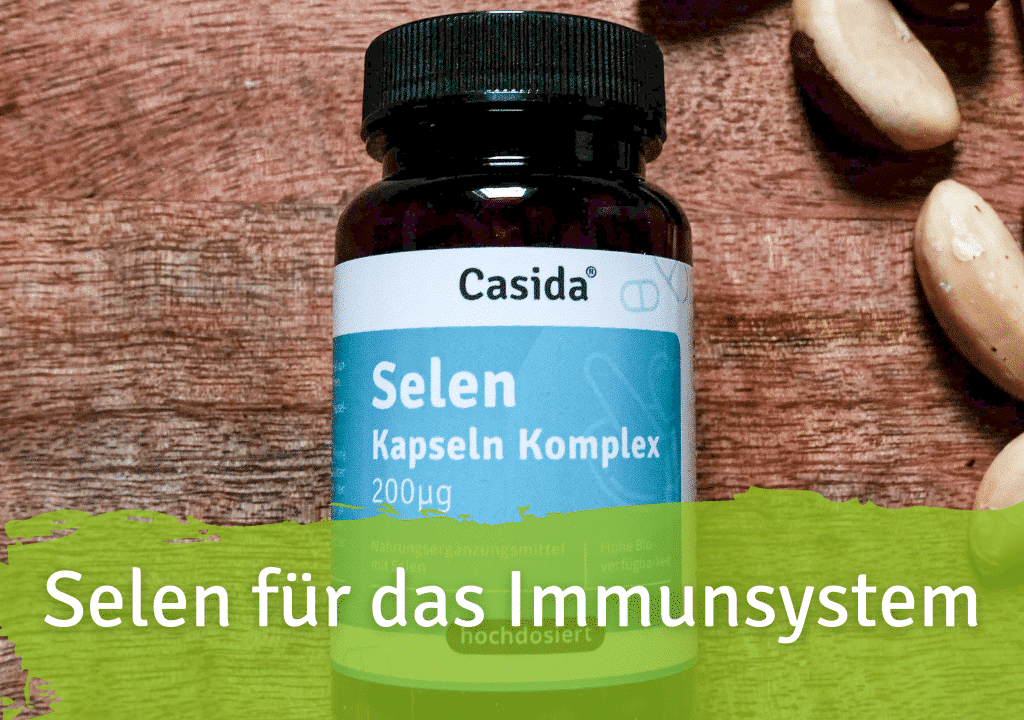The trace element selenium is vital in the human organism and, thanks to numerous immunomodulating properties, is particularly important for a strong immune system. In addition, the mineral is essential for the work of the thyroid gland and the protection of cells. Learn more about selenium and its importance for the human body and the immune system in this blog post.
What is selenium?
Selenium is a mineral that enters the body as a trace element through diet. But the quantity of selenium in food varies from area to area. Selenium gets into the vegetables and staples through the soil and its concentration in soil varies geographically. Most of the plant-based foods in Europe cannot adequately supply the body with the mineral due to the poor soil quality.
In contrast, the selenium content in foodstuffs from animal source hardly fluctuates due to homeostasis. Therefore, Europeans obtain selenium mainly through animal sources such as meat, fish or eggs. According to some research, the selenium content is said to have fallen on much of the agricultural land. Therefore it is important to eat consciously to ensure the sufficient supply of selenium. Natural supplements are also recommended if necessary.
What is the importance of selenium to the body?
Selenium is involved in many body processes and that is why it plays such an important role. The trace element – as a component of selenocysteine – is a component of many enzymes. These complex protein molecules accelerate the biochemical reactions in the body and are therefore considered essential for numerous processes.
Due to its involvement in different enzymes, selenium fulfills several functions in the body:
- As part of enzymes, it protects body cells from free radicals or oxidants and neutralizes them
- protects the cells from oxidative stress caused by alcohol or nicotine
- helps in the production of thyroid hormones, which play an important role in the metabolism of food, bones and the nervous system
- supports male fertility by facilitating sperm production
- maintain the normal function of immune system
What is the importance of selenium for the immune system ?
Selenium owes its central role in the immune system to its various effects on the body. As part of an important system in the body, the trace element helps to combat stress at the cellular level. Selenium helps the immune system to function normally and fights infections.
How can I top up the required selenium intake?
In order too answer this question, the average selenium content in the soils of the respective area must be known, as the regional differences are often huge. For this reason, there are no generalized statements about the selenium content in certain foods. However, there is one rule for this mineral: Selenium is mostly bound to proteins. It follows that a high protein diet is a good source of the trace element.
Brazil nuts are said to be the best source of selenium, as the trees accumulate the trace element to a high degree from the subsoil. However, these values can also vary due to the large differences in the soils. Dietary supplements are particularly suitable for a targeted and controlled supply of selenium. For example, we recommend the selenium capsules from Casida, as they offer an optimal combination of organic and inorganic selenium.
In which foods can I find selenium?
Due to the variation in the selenium content of the soil, its content in plant-based foods is also different. Unfortunately, the selenium content in most vegetables and staples from Europe are not rich enough. Nonetheless, there are some plants that absorb a comparatively high amount of selenium, including:
- Brazil nut tree
- Broccoli
- White cabbage
- Garlic
- Onions
- Mushrooms
- Asparagus
- Legumes
- Lentils
Animal-based foods are a more reliable source of the mineral. These include meat and, above all, innards, but also fish. This is because the animal feed is fortified with selenium. Around 30 to 70 micrograms are necessary to meet the daily selenium requirement. However, the reference values of the German Nutrition Society (DGE) differ depending on age and living situation. There are also different values for genders.
According to the DGE*, babies up to four months of age need 10 micrograms of selenium per day, while infants and children up to four years of age need 15 micrograms of selenium per day. In children between four and seven years of age it is 20 micrograms, between 7 and 10 years 30 micrograms and between 10 and 13 years 45 micrograms per day.
Adolescents from the age of 13 and girls and women from the age of 15 already need 60 micrograms of selenium to meet their daily needs. For boys and men aged 15 and over, the DGE recommends at least 70 micrograms per day. Breastfeeding women have the highest selenium requirement, namely from 75 micrograms, while the selenium requirement for pregnant women is even higher and must be adapted to personal needs.
Obtain selenium through dietary supplements
Our immune system fights against bacteria, viruses and germs every day. However, stress and a lack of important nutrients can impair the protective function of the immune system.
With a healthy and balanced diet, no dietary supplements are necessary for the supply of selenium. A healthy diet includes above all fresh fruit and vegetables as well as fish and meat in moderation at least once or twice a week, but also whole grain and dairy products. As a rule, with such a diet, the selenium intake is completely sufficient for the immune system.
However, our diet is becoming more and more irregular and unhealthy, which can quickly lead to a selenium deficiency. In this case, a supplement in the form of capsules or powder is definitely recommended. The selenium capsules from Casida are an additive-free complex of sodium selenite and selenium methionine, which ensures a balanced selenium content in the Body cares. The capsules are a natural variant that is vegan and cruelty free.
Citations:
*Selenbadarf laut DGE Deutsche Gesellschaft für Ernährung e.V. : https://www.dge.de/wissenschaft/referenzwerte/selen/?L=0

Hier schreibt:
Alexander HelmAlexander Helm is a licensed pharmacist (Martin-Luther University) and the founder of Casida. His vision is to combine pharmaceutical know-how and natural remedy into natural health products, and leverage the power of nature to improve human health.


